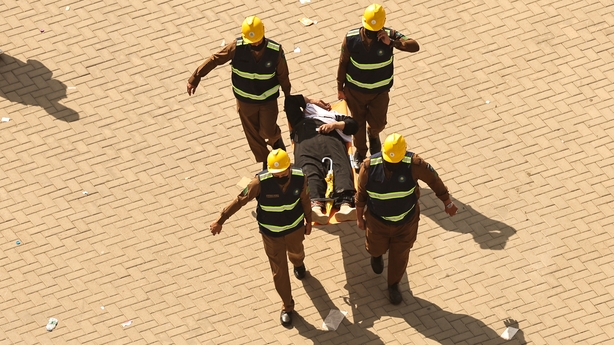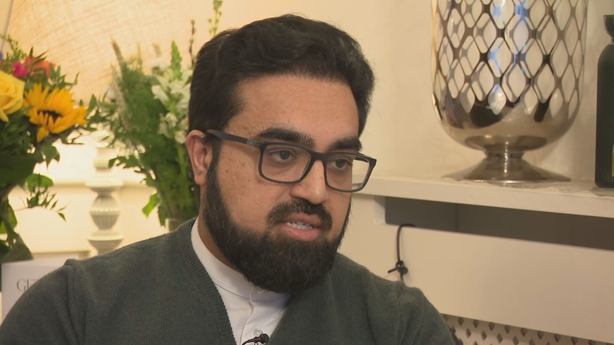The death toll from this year's hajj has exceeded 1,000, a tally has shown, with more than half of them unregistered worshippers who performed the pilgrimage in extreme heat in Saudi Arabia.
The new deaths included 58 from Egypt, according to an Arab diplomat who provided a breakdown showing that of 658 Egyptians who passed away, 630 were unregistered pilgrims.
All told, around 10 countries have reported 1,081 deaths during the annual pilgrimage, one of the five pillars of Islam which all Muslims with the means must complete at least once.
The figures have come via official statements or from diplomats working on their countries' responses.
The hajj, whose timing is determined by the lunar Islamic calendar, fell again this year during the oven-like Saudi summer.
The national meteorological centre reported a high of 51.8 degrees Celsius (125 Fahrenheit) this week at the Grand Mosque in Mecca.
According to a Saudi study published last month, temperatures in the area are rising 0.4 degrees Celsius each decade.
Each year tens of thousands of pilgrims attempt to perform the hajj through irregular channels as they cannot afford the often costly official permits.
Saudi authorities reported clearing hundreds of thousands of unregistered pilgrims from Mecca this month, but it appears many still participated in the main rites which began last Friday.
This group was more vulnerable to the heat because, without official permits, they could not access air-conditioned spaces provided by Saudi authorities for the 1.8 million authorised pilgrims to cool down after hours of walking and praying outside.
"People were tired after being chased by security forces before Arafat day. They were exhausted," one Arab diplomat said, referring to Saturday's day-long outdoor prayers that marked the hajj's climax.
The diplomat said the main cause of death among Egyptian pilgrims was the heat, which triggered complications related to high blood pressure and other issues.

Egyptian officials were visiting hospitals to obtain data on Egyptian pilgrims and help those still alive to get medical care, the foreign ministry said in a statement on Thursday.
"However, there are large numbers of Egyptian citizens who are not registered in hajj databases, which requires double the effort and a longer time to search for missing persons and find their relatives," the ministry said.
Up to 300 Irish on hajj
Up to 300 people from Ireland have performed the hajj pilgrimage in which hundreds of pilgrims have died due to extreme heat in Saudi Arabia.
The figures were provided by Chairperson of the Irish Muslim Council, who warned people not to undertake the pilgrimage without registering because unregistered pilgrims are not permitted to access air-conditioned spaces.
Shaykh Dr Umar Al-Qadri told RTÉ's News at One that so far none of the Irish pilgrims have been affected by the heat.
He said the hajj pilgrimage is a very physically demanding.
"You'll have to travel in four to five days a distance of about 25km on foot and considering the heatwave and climate change and especially temperatures that are close to 50C, it is you know understandable that people have lost their lives, especially elderly people," he said.
Dr Al-Qadri, who has made the hajj pilgrimage three times, advised people to do it when they are young.

"Do not delay it, you know because by delaying will mean that you will be less able to physically conduct all those actions, and if you try, you can actually hurt yourself.
"You can injure yourself, and unfortunately, the heatwave that is now going on and climate change is affecting us all," he said.
Read more:
Deaths of hajj pilgrims highlight how extreme heat kills
Saudi Arabia has not provided information on fatalities, though it reported more than 2,700 cases of "heat exhaustion" on Sunday alone.
Last year various countries reported more than 300 deaths during the hajj, mostly Indonesians.
The timing of the hajj moves back about 11 days each year in the Gregorian calendar, meaning that next year it will take place earlier in June, potentially in cooler conditions.
A 2019 study by the journal Geophysical Research Letters said because of climate change, heat stress for hajj pilgrims will exceed the "extreme danger threshold" from 2047 to 2052 and 2079 to 2086, "with increasing frequency and intensity as the century progresses".
Hosting the hajj is a source of prestige for the Saudi royal family, and King Salman's official title includes the words "Custodian of the Two Holy Mosques", in Mecca and Medina.
The hajj has been the scene of several stampedes and fires over the years, most recently in 2015 when a stampede during the "stoning the devil" ritual in Mina, near Mecca, killed up to 2,300 people in the event's mostly deadly disaster.


